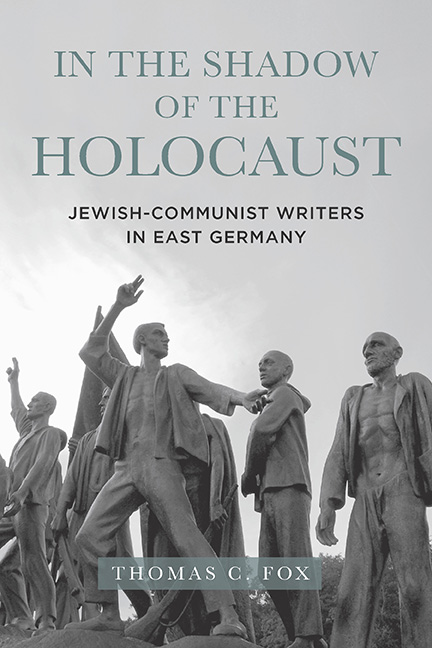Book contents
- Frontmatter
- Contents
- Preface
- Introduction: In the House of the Hangman
- Chapter One The Dead Mother: Anna Seghers
- Chapter Two Stefan Heym’s Negotiation of Communist-Jewish Identity
- Chapter Three The Dead Wife: Stephan Hermlin
- Chapter Four Expanding East German Holocaust Discourse: Peter Edel and Fred Wander
- Chapter Five The Dead Father: Jurek Becker
- Conclusion: “Let Us Speak German for an Hour.”
- Works Cited
- Index
Chapter One - The Dead Mother: Anna Seghers
Published online by Cambridge University Press: 26 May 2022
- Frontmatter
- Contents
- Preface
- Introduction: In the House of the Hangman
- Chapter One The Dead Mother: Anna Seghers
- Chapter Two Stefan Heym’s Negotiation of Communist-Jewish Identity
- Chapter Three The Dead Wife: Stephan Hermlin
- Chapter Four Expanding East German Holocaust Discourse: Peter Edel and Fred Wander
- Chapter Five The Dead Father: Jurek Becker
- Conclusion: “Let Us Speak German for an Hour.”
- Works Cited
- Index
Summary
Anna Seghers: German, Jew, Communist, Writer, Woman, Mother. One should reflect on each of these words. So many contradictory, seemingly mutually exclusive identities, so many deep, painful attachments, so many ways to be a target, so many challenges and the constant necessity to prove oneself, so many ways to get hurt, to be exposed, threatened all the way to danger of death.
—Christa WolfChrista Wolf (1929–2011), one of the most talented and profound writers from the former East Germany, learned much from Anna Seghers, who functioned as her mentor. In one of Wolf's many musings about Seghers one finds the epigram above; it outlines the multiple “contradictory, seemingly mutually exclusive identities” of Seghers, how those identities rendered her vulnerable and opened her to deathly danger. It is not, to be sure, immediately apparent how all these identities should exclude each other; for example, it is hard to see why one could not be simultaneously a Jew, a woman, and a mother. Of interest to us, however, are Wolf's first three apparently mutually exclusive categories, that of German, Jew, and Communist, as well as the fashion in which those identities brought Seghers into peril, and not only from the Nazis.
Like many Jewish Communists of her generation, Seghers did not emphasize her Jewishness in her writing or her public pronouncements; if anything—and again, she is hardly alone in this respect—the opposite holds true. Yet her practiced repression breaks down in the mid-1940s, when a series of events—notably, the murder of her mother by the Nazis and her own near-death experience in exile—combined to break the contours of her carefully constructed personality. Her writing from that time—“Der Ausflug der toten Mädchen” (“The Excursion of the Dead Girls”), “Post ins Gelobte Land” (“Post to the Promised Land”), “Das Ende” (“The End”), and “Passagiere der Luftbrücke” (Passengers of the Berlin airlift)—strikes an uncharacteristic but intensely personal note and it struggles with raw emotion. Marie Haller-Nevermann asserts of “Post ins Gelobte Land,” for example, that Seghers's use of the word pogrom alone seems to have unleashed an eruption that exposed a longburied theme (1997, 105).
- Type
- Chapter
- Information
- In the Shadow of the HolocaustJewish-Communist Writers in East Germany, pp. 27 - 64Publisher: Boydell & BrewerPrint publication year: 2022

